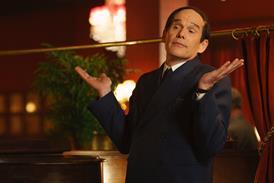- News
- Reviews
- Features
- Festivals
- Box Office
 ‘Avatar: Fire And Ash’ hits $760m at global box office after strong hold; Italy’s ‘Buen Camino’ delivers Christmas smash
‘Avatar: Fire And Ash’ hits $760m at global box office after strong hold; Italy’s ‘Buen Camino’ delivers Christmas smash UK-Ireland box office preview: ‘The Housemaid’, ‘The SpongeBob Movie: Search For SquarePants’ lead festive releases
UK-Ireland box office preview: ‘The Housemaid’, ‘The SpongeBob Movie: Search For SquarePants’ lead festive releases ‘Avatar: Fire And Ash’ heats up UK-Ireland box office with £9m opening
‘Avatar: Fire And Ash’ heats up UK-Ireland box office with £9m opening
- Awards
 Bafta flashback: ‘Man On Wire’ duo James Marsh and Simon Chinn on beating Danny Boyle and becoming Oscar favourites
Bafta flashback: ‘Man On Wire’ duo James Marsh and Simon Chinn on beating Danny Boyle and becoming Oscar favourites Nia DaCosta on her gender-flipped adaptation of an Ibsen classic: “Making Hedda mixed-race added layers to her torture”
Nia DaCosta on her gender-flipped adaptation of an Ibsen classic: “Making Hedda mixed-race added layers to her torture” Ethan Hawke on playing Lorenz Hart in ‘Blue Moon’ and how Philip Seymour Hoffman changed the trajectory of his career
Ethan Hawke on playing Lorenz Hart in ‘Blue Moon’ and how Philip Seymour Hoffman changed the trajectory of his career
- Subscribe

Subscribe to Screen International
- Monthly print editions
- Awards season weeklies
- Stars of Tomorrow and exclusive supplements
- Over 16 years of archived content
- Global production
Malta: inward production
By Geoffrey Macnab2007-03-30T00:00:00
In recent years, Malta has successfully attracted some ambitious projects, such as Troy and Munich. The Mediterranean island may offer tax credits, ocean-side water tanks, sunshine and plenty of spectacular locations but the challenge now is to lure big US projects in the face of heavy competition from Eastern European ...
SIGN IN if you have an account
Do you want to keep reading?
Register for free access to five articles a month

Subscribe today and unlock access to:
- Unlimited film & TV news, reviews and analysis on Screendaily.com
- All print and/or digital editions of Screen magazine
- Breaking news alerts sent straight to your inbox
- Digital festival and market dailies
- Weekly awards magazines
Access premium content Subscribe today
If you have an account you can SIGN IN now
Subscribe to Screen International
Screen International is the essential resource for the international film industry. Subscribe now for monthly editions, awards season weeklies, access to the Screen International archive and supplements including Stars of Tomorrow and World of Locations.
Find out moreSite powered by Webvision Cloud











